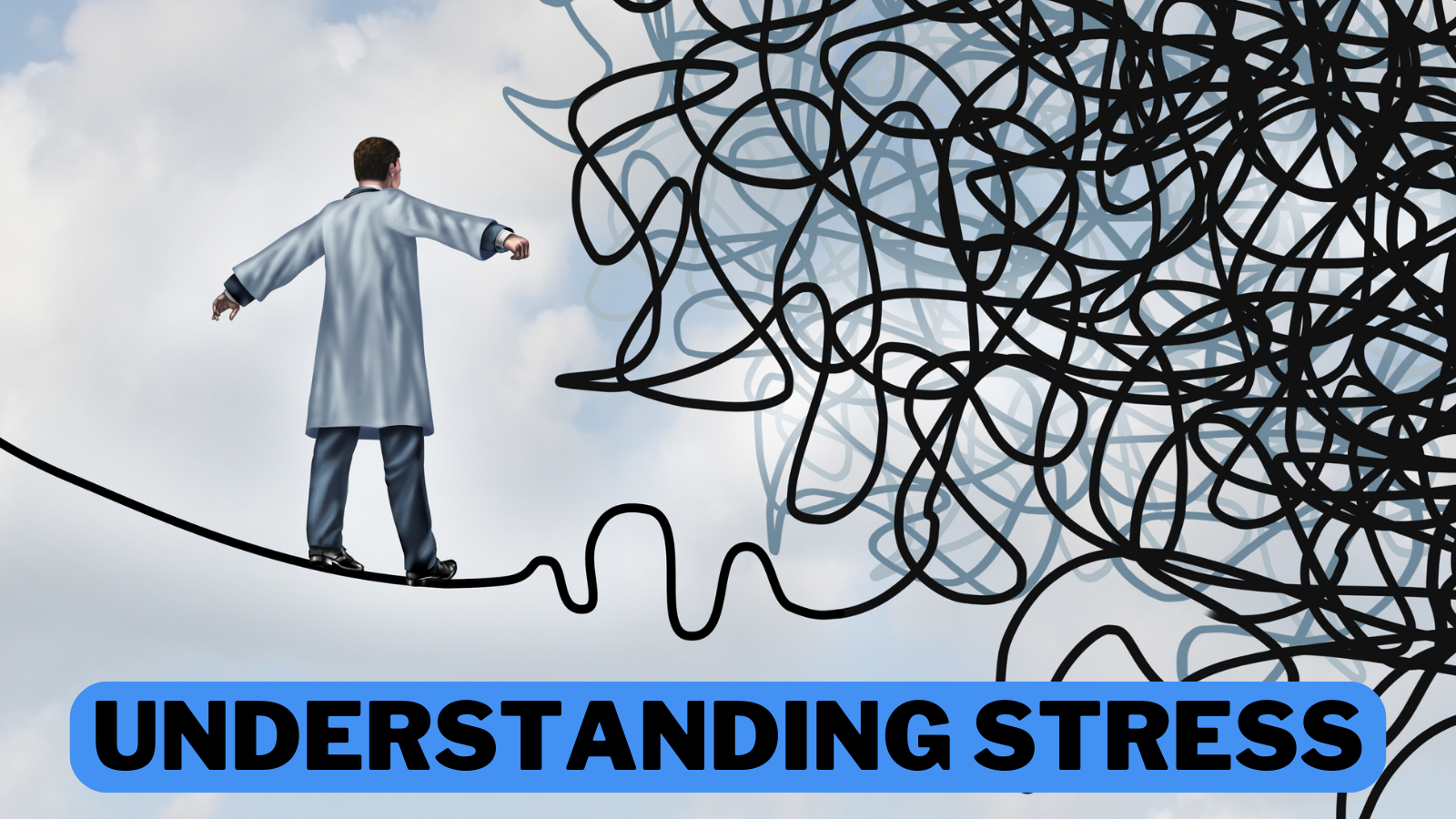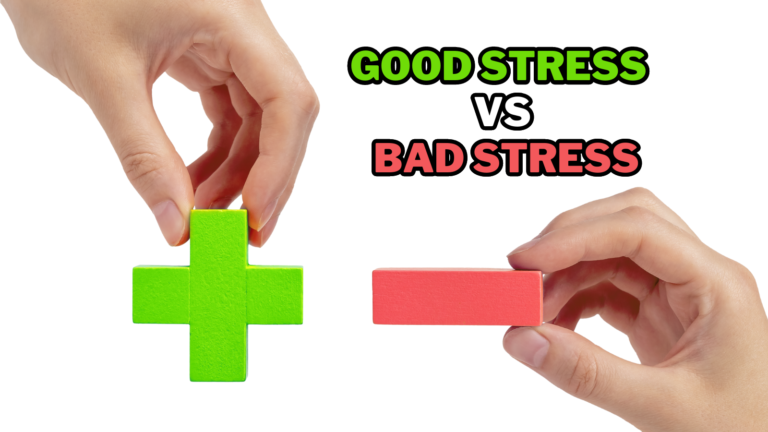Understanding Stress
Understanding Stress
Stress is a normal part of life, and everyone experiences it occasionally. It is a natural response to challenging or threatening situations and can be beneficial in small doses, helping us to stay alert and focused.
However, when stress becomes chronic or overwhelming, it can harm physical and mental health, leading to fatigue, anxiety, depression, and even chronic disease.
In this post, we will explore the concept of stress in more detail, including what causes it, how it affects the body and mind, and some effective ways to manage it.
Whether you are dealing with stress daily or just looking to learn more about this common issue, this post will provide valuable insights and tips for reducing the impact of stress on your life.

What Is Stress?
Stress is a natural response to challenging or threatening situations. It is a physiological and psychological reaction that responds to a perceived threat or demand. Stress can be experienced in various cases, from daily hassles to major life events.
When we experience stress, our bodies activate the “fight or flight” response, a survival mechanism that prepares us to confront or run away from the perceived threat.
The fight or flight response is characterized by releasing hormones such as cortisol and adrenaline, which increase heart rate, blood pressure, and respiration to provide the body with the energy and focus needed to respond to the perceived threat.
While the fight or flight response can be beneficial in certain situations, such as when we need to escape a dangerous situation, it can also be harmful if activated too frequently or for too long.
Chronic stress, or stress experienced over a prolonged period, can negatively affect physical and mental health.
Some common causes of stress include work or school-related pressures, financial problems, relationship issues, health concerns, and major life changes such as moving or starting a new job. A lack of social support, poor self-care habits, and a negative mindset can also exacerbate stress.
Symptoms of stress can vary from person to person. Still, they may include physical symptoms such as headaches, muscle tension, and fatigue and emotional symptoms such as irritability, anxiety, and depression.
If left unchecked, chronic stress can increase the risk of several physical health problems, including heart disease, obesity, and digestive issues.
While it is impossible to eliminate stress from our lives, several effective strategies exist. These may include mindfulness practices, relaxation exercises, regular exercise, healthy eating, and seeking social support from friends and family. In some cases, seeking professional help from a therapist or counsellor may also be beneficial.

The Science Of Stress
The stress response is a complex physiological process involving multiple body systems. When a person experiences a stressful situation, their body responds by activating the sympathetic nervous system, which releases hormones like adrenaline and cortisol.
Adrenaline is responsible for the immediate physical changes during the stress response, such as increased heart rate and blood pressure.
Cortisol, on the other hand, is a hormone that is released more gradually in response to stress. Cortisol helps increase glucose levels in the bloodstream, providing the body with energy to respond to perceived threats.
The hypothalamic-pituitary-adrenal (HPA) axis and the sympathetic nervous system are crucial to the stress response. The hypothalamus, pituitary, and adrenal glands interact intricately as part of the HPA axis.
The pituitary gland receives a signal from the hypothalamus to release an adrenocorticotropic hormone in response to a stressful scenario (ACTH). ACTH then tells the adrenal glands to release cortisol.
Cortisol has several effects on the body. In addition to increased glucose levels, cortisol also suppresses the immune system, leaving individuals more susceptible to illness.
It also affects the digestive system, slowing down digestion and causing stomach problems in some people.
Chronic stress and the resulting cortisol release can also negatively affect mental health, leading to symptoms such as anxiety and depression.
While the stress response can benefit some situations, chronic stress can negatively affect physical and mental health.
Therefore, it is important to learn effective stress management strategies to reduce the impact of stress on the body and mind.

Types Of Stress
Individuals may experience several different types of stress throughout their lives. These include:
1. Acute Stress
When an individual experiences acute stress, their body responds with a cascade of physiological changes known as the “fight or flight” response.
This response is a natural survival mechanism that prepares the body to fight or flee in the face of a perceived threat.
During the fight or flight response, the body releases hormones such as adrenaline and cortisol, which increase heart rate and blood pressure and cause the muscles to tense up.
This helps to provide the body with the energy and focus needed to respond quickly to the perceived threat.
In the short term, acute stress can help individuals respond quickly and effectively to potentially dangerous situations.
However, if acute stress becomes chronic or is not managed effectively, it can negatively affect physical and mental health.
Effective stress management strategies, such as mindfulness techniques and exercise, can help individuals manage acute stress and prevent it from becoming chronic or harmful.

2. Chronic Stress
Chronic stress is a type of stress that persists over a prolonged period and can be caused by ongoing life events, such as work or family problems.
It can also be caused by traumatic experiences, such as abuse or neglect, that have long-lasting effects on an individual's mental and emotional well-being.
Chronic stress can negatively affect physical and mental health if left unchecked. It can lead to a weakened immune system, increased blood pressure, and an increased risk of heart disease and other chronic health conditions. Also, it may exacerbate mental health conditions, including sadness and anxiety.
Chronic stress can also harm behaviour and cognitive function. It can affect memory and concentration, modify eating habits and sleep schedules, and alter sleep quality.
It can also contribute to developing unhealthy coping mechanisms, such as substance abuse or overeating, which can further exacerbate the negative effects of chronic stress.
Managing chronic stress requires a comprehensive approach that includes identifying and addressing the underlying causes and implementing effective stress management techniques such as meditation, exercise, and therapy. It is important to seek help and support if chronic stress affects your quality of life or well-being.
3. Episodic Acute Stress
Episodic acute stress is a type of stress that frequently occurs in some individuals due to their high-pressure jobs, demanding relationships, or other life situations.
Individuals who experience episodic acute stress may often find themselves in crisis mode, constantly responding to perceived threats or stressors in their environment.
This type of stress can be harmful if it is not effectively managed. Individuals who experience episodic acute stress may be at increased risk for health problems such as heart disease, depression, and anxiety.
They may also struggle with maintaining healthy relationships and experience challenges at work or elsewhere.
Effective stress management strategies such as cognitive-behavioural therapy, mindfulness techniques, and relaxation exercises can help individuals with episodic acute stress manage their symptoms and reduce the negative impact of stress on their lives.
It may also be helpful for individuals to make changes to their lifestyle or environment to reduce the frequency or severity of stressors that trigger their stress response.
Seeking help from a mental health professional or stress management expert can also be beneficial.

4. Traumatic Stress
Traumatic stress is a type of stress that occurs due to exposure to a traumatic event or series of events.
Traumatic events can include natural disasters, serious accidents, acts of violence or abuse, or other experiences threatening an individual's safety or well-being.
Traumatic stress can have long-lasting effects on mental health and may require professional intervention.
Individuals who experience traumatic stress may struggle with symptoms such as flashbacks, nightmares, avoidance behaviours, and a heightened sense of anxiety or fear.
They may also experience various physical symptoms, such as headaches, digestive problems, and chronic pain.
Effective treatment for traumatic stress typically involves a combination of therapy and medication.
Therapies such as cognitive-behavioural therapy (CBT), exposure therapy, and eye movement desensitization and reprocessing (EMDR) can help individuals to process and work through their traumatic experiences.
Antidepressants and anti-anxiety medications may also be used to manage symptoms. In addition to professional treatment, several self-care strategies can help individuals manage traumatic stress.
These may include relaxation techniques such as meditation or deep breathing exercises, regular exercise or physical activity, and seeking support from friends and family members.
It is important to seek help from a mental health professional if traumatic stress affects your quality of life or well-being.
5. Developmental Stress
Developmental stress is a type of stress that is associated with life transitions or changes that require individuals to adapt to new circumstances.
These positive and negative transitions may include starting a new job, moving to a new city, getting married, having a child, or retiring.
While developmental stress is a normal part of life, it can still be challenging. It may require individuals to develop new coping skills or adjust their existing coping strategies.
For example, someone who has just become a parent may need to learn how to manage their time more efficiently or develop new routines to accommodate their child's needs.
If not effectively managed, developmental stress can lead to negative outcomes such as burnout, fatigue, or overwhelming feelings.
It is important to seek support from friends, family members, or a mental health professional if you are experiencing significant stress related to a life transition or change.
Additionally, practicing stress management techniques such as meditation, exercise, or deep breathing exercises can help reduce stress and promote overall well-being.
Symptoms Of Stress
Stress can manifest in various physical, emotional, and behavioural symptoms. Some common symptoms of stress include:

1. Physical Symptoms
Headaches are a common symptom of stress and can be caused by tension in the neck and shoulder muscles.
Fatigue is another common symptom caused by disrupted sleep patterns or the body's natural response to stress hormones.
Muscle tension or pain can also result from stress as the body prepares to respond to perceived threats by tensing up. This tension can lead to muscle soreness or even injury.
Digestive issues, such as nausea, bloating, and constipation, are also common symptoms of stress.
When the body is under pressure, it releases hormones that can affect the digestive system, leading to discomfort or illness.
Trouble sleeping is another symptom of stress and can be caused by anxiety or racing thoughts. Sleep is important to overall health, and chronic sleep disturbances can negatively affect physical and mental health.
It is important to note that while these physical symptoms can be associated with stress, they can also be caused by other factors.
If you are experiencing any of these symptoms, speaking with a healthcare professional to determine the underlying cause and develop an appropriate treatment plan is important.

2. Emotional Symptoms
Anxiety is a common emotional symptom of stress, characterized by feelings of worry or fear that can be difficult to control.
People may also experience physical anxiety symptoms, such as a racing heart, sweating, or trembling.
Depression can also result from stress, sadness, hopelessness, and loss of interest in activities. Depression can have significant negative impacts on overall health and well-being.
Irritability and mood swings are also common emotional symptoms of stress. When under pressure, individuals may feel more easily frustrated or short-tempered than usual, leading to conflict with others.
Feeling overwhelmed or helpless is another emotional symptom of stress. When faced with a challenging situation, people may feel like they have no control over the outcome, leading to hopelessness.
It is important to recognize and address these emotional symptoms of stress, as they can significantly impact mental health and overall well-being.
Speaking with a mental health professional or engaging in stress-reducing activities like meditation or yoga can help manage these symptoms.

3. Behavioural Symptoms
Stress can lead to various behavioural symptoms that may affect an individual's ability to function daily. These symptoms can vary depending on the individual and the nature of the stress they are experiencing.
One common behavioural symptom of stress is overeating or undereating. Stress can affect appetite, leading to changes in eating habits that can result in weight gain or loss.
This can also be related to stress-related hormonal changes, such as increased cortisol levels, which can stimulate the appetite and contribute to overeating.
Increased use of drugs or alcohol is another behavioural symptom of stress. People may turn to substances to cope with stress, seeking relief from the emotional or physical discomfort they are experiencing.
However, substance use can lead to various negative consequences, including addiction, impaired judgment, and an increased risk of accidents or injury.
Social withdrawal is another behavioural symptom of stress. When faced with a stressful situation, some people may withdraw from social interactions and avoid contact with friends or family.
This can lead to feelings of loneliness and isolation, further exacerbating the negative impacts of stress on mental health.
Addressing these behavioural symptoms of stress is important, as they can significantly impact overall health and well-being.
Engaging in stress-reducing activities, such as exercise or meditation, and seeking support from friends, family, or a mental health professional can help manage these symptoms.

4. Cognitive Symptoms
Cognitive symptoms refer to changes in a person's thinking patterns that can result from stress. Stress can affect concentration, making it difficult to focus on tasks or remember important information.
This can be especially problematic in academic or work settings, where high levels of engagement and memory are necessary.
Stress can also affect a person's decision-making abilities, making it harder to decide and weigh the pros and cons of different options.
Racing thoughts and obsessive worrying are also common cognitive symptoms of stress. People may be unable to turn off their thoughts or stop worrying about a particular issue, leading to ongoing anxiety and mental exhaustion.
In some cases, stress can also lead to forgetfulness, making it harder to recall important details or complete tasks.
This can be especially problematic for people dealing with multiple stressors at once, as they may feel overwhelmed and unable to keep up with their daily responsibilities.
Overall, cognitive symptoms of stress can significantly impact a person's ability to function daily and exacerbate feelings of anxiety and depression.

Conclusion
Stress is a natural response to the demands of daily life, but when it becomes chronic or overwhelming, it can significantly impact mental and physical health. Recognizing stress's different types and symptoms is important for managing it effectively.
Learning stress management techniques such as yoga, meditation, and exercise and seeking support from mental health professionals can help individuals cope with stress and improve their overall well-being. Taking care of ourselves and managing stress effectively can lead to happier and healthier lives.
I trust you enjoyed this article about Understanding Stress. Please stay tuned for more blog posts to come shortly.
JeannetteZ
>>>Please click here to read my all-inclusive article about Lessons That Will Teach You All About Stress<<<
>>>Are you interested in Natural Healing And Stress Relief through Herbs? Please click here for my #1 Recommendation<<<
Your Opinion Is Important To Me
Thoughts? Ideas? Questions? I would love to hear from you. Please leave me your questions, experiences, and remarks about Understanding Stress in the comments section below. You can also reach me by email at Jeannette@Close-To-Nature.org.
Disclosure
This post may contain affiliate links. I earn from qualifying purchases as an Amazon Associate and other affiliate programs. Please read my full affiliate disclosure.
You might also enjoy these blog posts:
Learning A Language And Stress Management
9 Best Stress Relief Techniques
How Does Nature Impact Our Wellbeing
9 Best Ways To Relieve Stress With Nature








